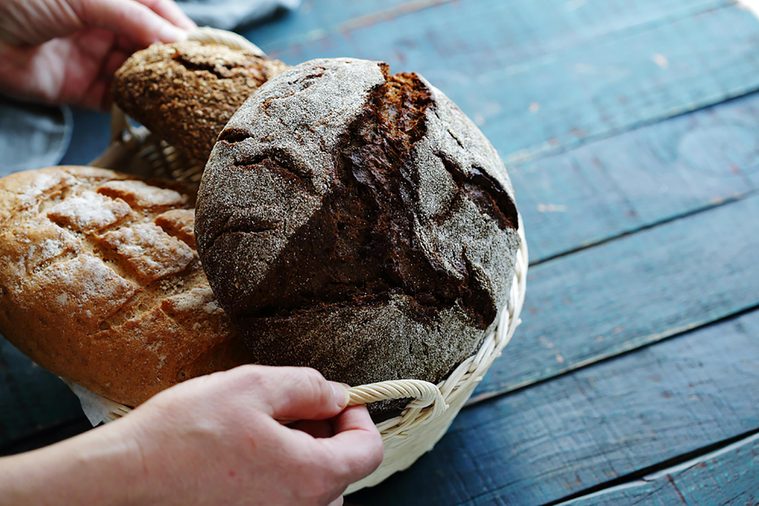You Should Be Eating Bread at the END of Your Meal—Here’s Why
Updated: Mar. 02, 2021
Bread before dinner? Just say no. Bread after dinner? You're free to indulge, according to a new scientific study that looks at optimal timing to eat carbs.
 They say timing is everything, and they’re not just talking about relationships. There’s a right time to do just about anything if you want to make the most of your day. There’s a right time to eat dinner, for example. And now it turns out there’s a right time to eat carbs, and it’s not before dinner.
They say timing is everything, and they’re not just talking about relationships. There’s a right time to do just about anything if you want to make the most of your day. There’s a right time to eat dinner, for example. And now it turns out there’s a right time to eat carbs, and it’s not before dinner.
According to a new study published in the academic journal, BMJ Open Diabetes Research & Care, eating carbs at the end of a meal is a simple but reliable strategy for keeping your blood sugar levels steady—which we already know is important to maintaining good health and a healthy weight.
The study, led by Louis J. Aronne, MD, FACP, Sanford Weill Professor of Metabolic Research at the Comprehensive Weight Control center at Weill Cornell Medicine and NewYork-Presbyterian, was inspired by what was then a lack of scientific data on how when you eat carbs in relation to the rest of your meal affects your blood sugar. Dr. Aronne’s team of researchers (from Weill Cornell, as well as Columbia University and Boston Children’s Hospital) recruited 16 middle-aged adults with type 2 diabetes to eat the same meal consisting of protein, veggies, and a carbohydrate, on each of three separate days. The catch was that each day, the meal was timed in one of three ways:
- Carbohydrates, followed 10 minutes later by protein and vegetables
- Protein and vegetables, followed 10 minutes later by carbohydrates
- Protein, vegetables, and carbohydrates all served at the same time
Each person had their blood sugar levels measured just before they ate, and then every 30 minutes after for 180 minutes. The results were stunning, according to Dr. Aronne’s colleague and research team-member, Alpana Shukla, MD, MRCP, assistant professor of research in medicine and director of clinical research at Weill Cornell, who spoke with Reader’s Digest about the study.
“Eating carbs at the end of the meal resulted in 53.8 percent lower blood sugar levels than eating carbs before the rest of the meal, and 40.4 percent lower blood sugar levels than eating everything at the same time,” she says. That means when you eat carbs in relation to the rest of your meal has a significant impact on blood sugar levels.
The researchers also noted that insulin levels were significantly lower when the people saved their carbs until the end of the meal. Since insulin is necessary for the metabolism of blood sugar, this suggested to the team that eating carbs at the end of a meal may require less insulin. Since type 2 diabetes is characterized by the body’s inability to properly utilize insulin to metabolize blood sugar, thus requiring type 2 diabetics to take meds to help lower their blood sugar after meals, Dr. Shukla says that this carbs-last meal structure may prove to be a basis for reducing the dose of medications, including insulin, for management of type-2 diabetes.
It’s possible that the carbs-last meal structure can help you avoid packing on pounds, as higher levels of insulin are associated with weight gain. Since the carbs-last meal structure resulted in lower insulin levels (along with corresponding higher glucagon-like peptide 1 levels, which are associated with weight loss), it’s possible that making the simple change (saving carbs for the end of the meal) may help with weight management, even in non-diabetics.
Although further study is required, it appears that Drs. Aronne and Shukla and their colleagues have made in-roads into using behavioral techniques to manage the metabolism.
Did you know that exercising also can have a positive effect on blood sugar metabolism?
